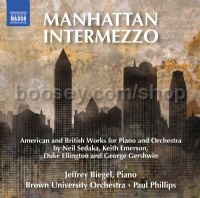Manhattan Intermezzo (Naxos Audio CD)
Manhattan Intermezzo (Naxos Audio CD)
Special Offer
* Estimated price converted from UK retail price
This programme brings together four works for piano and orchestra by composers best known from the fields of jazz, popular song and progressive rock. Neil Sedaka’s Manhattan Intermezzo explores the New York of today and yesterday with its melting pot of nationalities. Keith Emerson is best known as a founding member of Emerson Lake & Palmer. His remarkably inventive semi-autobiographical Piano Concerto No. 1 fuses his classical training with jazz. Duke Ellington’s sublime New World a-Comin’ is a visualisation of improved conditions for black people in America, while the rarely heard original version of Gershwin’s Rhapsody in Blue represents the quintessential style of New York City in the Roaring Twenties.
Rediscovered in brand new recordings, the four works on this album share a connection with New York City. The works by Neil Sedaka and Keith Emerson have only been recorded once before with their composers at the keyboard. This is only the second recording of Duke Ellington’s New World a-Comin’ in its arrangement by Maurice Peress, and pianist Jeffrey Biegel’s reinterpretation of Gershwin’s Rhapsody in Blue brings striking new perspectives to a familiar masterpiece.
Virtuoso pianist Jeffrey Biegel has received wide acclaim for his recordings, including with Ellen Taaffe Zwilich’s Millennium Fantasy (8.559656) made a ClassicsToday.com ‘Disc of the Month’ and described as “uniformly excellent. A splendid disc… in all respects, and a mandatory acquisition if you’re interested in good contemporary music.” ClassicsToday.com also gave a 10/10 recommendation to Biegel’s recording of Leroy Anderson’s Piano Concerto (8.559313).
These performances have been given the highest praise by the composers. Neil Sedaka called this “wonderful recording of Manhattan Intermezzo…a real feather in my cap!” Keith Emerson compliments Jeffrey Biegel, “who has captured the beauty of nature and desolation…with a sense of optimism in the final triumphant movement. This is a fantastic recording!”
Neil Sedaka was trained in his early years to be a classical pianist, and as a teenage virtuoso he was selected by Arthur Rubinstein to play on WQXR, New York’s leading classical music station. By the age of thirteen Sedaka had also begun writing songs, setting lyrics by his high school friend Howard Greenfield. In 1958, Sedaka and Greenfield had their first major songwriting success with Stupid Cupid, which Connie Francis recorded. In 1962, Breaking Up is Hard to Do, which became Sedaka’s signature song, was his first song to reach No. 1 in the charts. Beyond the US and UK, he also enjoyed great success in Italy, Latin America, Japan and Australia. Sedaka’s recording of Manhattan Intermezzo, made with the London Philharmonic Orchestra at Air Studios in London, is the final track on The Real Neil, an album released in 2012. On this new recording, pianist Jeffrey Biegel, with the composer’s approval, plays his own
embellished version of the piano part.




